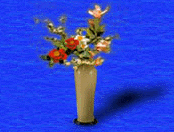
![]()


![]()

The Miscellanies from Tung Tien states: The osmanthus, mei flower, jasmine, tu mi and gardenia are the only flowers to whom one may play the lute. The flowers appearing in this composition happen to be osmanthus. The musician has his full attention focused on his subject, whose whispy branches seem almost, to be dancing in accompaniment to the music. The container, a green bronze tripod, is mounted on a table of Lake Tai rocks in a setting of old-time grace and simplicity.
Potted plants of all sizes, combined with unusual rock formations, gained great popularity as household decorations during the Sung Dynasty. The large plum blossom plant in the upper left of the painting, coupled with an exotically shaped stone, is a good example of these potted flower compositions. On the low table in the lower left stands another potted plant, along with two potted intellectual flower arrangements, and on the dresser at the fight is a smaller arrangement. This smaller composition contains narcissus in the study room style. Its vase is mounted on a protective base of sandalwood, carved in exquisite intaglio.
![]()
Escapism had a strong grip on artistic imagination during the Yuan Dynasty. In flower arranging, this influence found its expression in an intense assertiveness and individualism, resulting in highly unorthodox and asymmetrical compositions. The proportions of the flowers and vase which form the core of this arrangement, for example, are in the ratio of 8 to 5, with the bamboo occupying the central position to soften up the stalkness of the lotus stems. Branches are profuse and disorderly. The lotus soars straight up from the ground toward the sky, with a petal resting upon a leaf in a mood of utter loneliness and desolation , while the large ceramic vase standing guard below serves as a perfect foil.


![]()
[preface] [
styles] [religious]
[palace]
[literati]
[folk] [9 pricniples]
[significance] [preveration]
[vessels] [appreciatin]
[Pavilion of Taiwan,
R.O.c] [Cultures]
[Council For Cultural
Affairs]